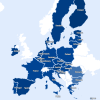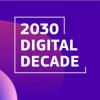Digital Economy and Society Index (DESI)
The Digital Economy and Society Index (DESI) monitors the digital performance of EU Member States according to key indicators and tracks individual evolution in terms of digital competitiveness. DESI is an initiative by the European Commission's Directorate-General for Communications Networks, Content and Technology, DG CONNECT. Today, DESI is a recognised and authoritative source, which facilitates the work of researchers, statisticians, private companies, policymakers and local and national governments through the provision of high-quality resources allowing for comparisons between different countries, business sectors, or trends.
The Digital Decade Policy Programme assigns DESI a new and important role for monitoring the progress made by the EU in the context of the Digital Decade.
About DESI
DESI, which came out first in 2015 based on data for 2014, contributes to the objectives of the EU SME Strategy for a Sustainable and Digital Europe, announced by the European Commission on 10 March 2020. Within this framework, the index will be deployed to monitor the annual progress of small and medium sized enterprises (SMEs) when it comes to digitalisation and digital maturity levels. DESI tracks digital performance across 5 key dimensions: Connectivity, Human Capital, Use of Internet Services, Integration of Digital Technology, and Digital Public Services.
Added value of DESI
Each dimension is accompanied by a thematic chapter with more in-depth analysis and a dedicated report. The analysis is offered annually in various formats, both short and long, and focusing on broader impact of technology, as well as on the more specific applications and digital integration of emerging technologies. Other actions streamlined or enabled through DESI include:
- Country reports: DESI offers country-by-country reporting on Member States' digital performance. The data, collected and analysed via the indicator allows local and regional administrations, public services, and national governments prioritise reform and investment needs and develop coherent policies, integrating insight from the annual report. DESI will also act as a mechanism, used by the European Commission to improve access to the EU Recovery and Resilience Facility, the EU long term plan, which pools €672.5 billion in the form of loans and grants to support Europe's post-pandemic recovery. Country reports also zoom in on particular aspects, for instance on the uptake of new technologies by specific sectors, or digital skills and competences. The reports can be downloaded in PDF formats.
- Visualisation tool: a tool allowing policymakers, users, and business owners to compare Europe's position with regards to neighbouring Member States and countries. The tool also offers an opportunity to visualise the changes undergone on a national level over the last 5 years in a dynamic and interactive way.
- Women in Digital Scoreboard (WiD): the scoreboard has been part of DESI since its introduction in 2019. It monitors the participation of women in the digital economy and assesses digital inclusion in jobs, careers and entrepreneurial projects.
Additional resources, reports, publications are offered via DESI in the form of short executive summaries, analytical data, and more comprehensive and detailed analysis. International DESI mirrors and extends its European counterpart, by using datasets to offer trend analysis, spanning across 45 countries (27 Member States and 18 non-EU countries).





